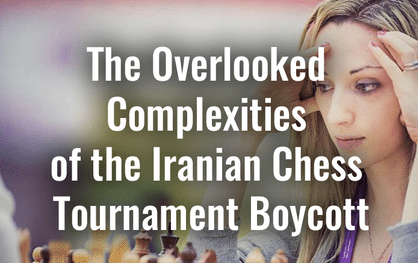[Co-authored with Scott Jacobsen]
Swedish chess players and the US Champion, Nazi Paikidze, have been outspoken about their refusal to wear the hijab in Tehran, Iran for the Women’s World Chess Championship.
At the moment, many of the more pertinent arguments are centered around what benefits Iranian women. This makes sense, considering the restrictive dress code for women in Iran. What seems to have been forgotten, however, is that women have a right to boycott Iran simply for their own rights as individuals not to wear the hijab. Even if boycotting the tournament hurts Iranian women, neither Paikidze nor the Swedish players have an obligation to play in Iran if it means wearing a clothing item that is enforced for women and not men.
There are two angles from which to consider the boycott. First, the question of what will promote Iranian women’s participation in public life. Second, the less discussed angle about individual rights, especially as applied to individual women in this instance. Each perspective has validity.
Let’s consider the angle of Iranian women’s participation in public life first. If the tournament is held in Iran, girls in Iran will see women in an international professional capacity. Right now, Iranian women make up 60 percent of Iran’s university students, yet less than 20 percent of the country’s working population. In 2015, an Iranian football player was unable to play in an international tournament because her husband did not permit her to travel. Seeing the Iranian women’s chess team compete in an international tournament could have a positive impact on young girls in Iran who wish to be a part of their country’s workforce, and particularly those who wish to become athletes.
Women Iranian chess grandmasters, Sara Khadem and Mitra Hejazipour, consider the boycott detrimental to women’s sports in Iran, as it would deprive them of what Hejazipour describes as “an opportunity to show our strength.” This is a fairly solid argument against the boycott, if the tournament does end up taking place in the Islamic Republic.
If, however, the Swedish and American players can push the tournament not to be held in Iran, then their decision to boycott is for the best. It will make the statement that this tournament will not be held in a country that tells women what to wear. Young Iranian girls will still get to watch Iranian women play chess, even if it’s on a television screen. But if the tournament cannot be moved to another country, then they should not boycott the championship, because they will be denying Iranian women a major opportunity.
Now consider the angle of the individual right of Paikdze to not wear a hijab. Individual rights to freedom of dress are important because the individual is the fundamental unit within society, nationally and globally. A woman exercising her own right as an individual to not wear a piece of clothing is making a stand for the collective rights of women.
Which angle is more important? This is a question for all progressives to consider. The individual rights of the Swedish and American players, which is a part of the universal right of women to not wear a veil? Or the inspiration for girls in seeing powerful female role models in a country where women are often discriminated against in the public sphere?
If worst comes to worst, and the tournament officials insist that the tournament be held in Iran, then the Swedish and American players have every right to boycott the tournament altogether due to their own rights as individuals not to wear the hijab. But, again, will it benefit Iranian women more than the opportunity to compete in a tournament while wearing the hijab? The answer to that, we believe, is no.
If, however, the Swedish and American players are able to push the tournament to be held in another country, their boycott of Iran could be a success. This way, chess players of all nationalities will be allowed to compete wearing whatever they choose to wear.
Something is, nevertheless, straightforward: this is surely a very pivotal time for the larger discourse concerning women’s rights. A dilemma for feminists has emerged, a dilemma that will, you can be sure, have far-reaching significance.







Article Discussion